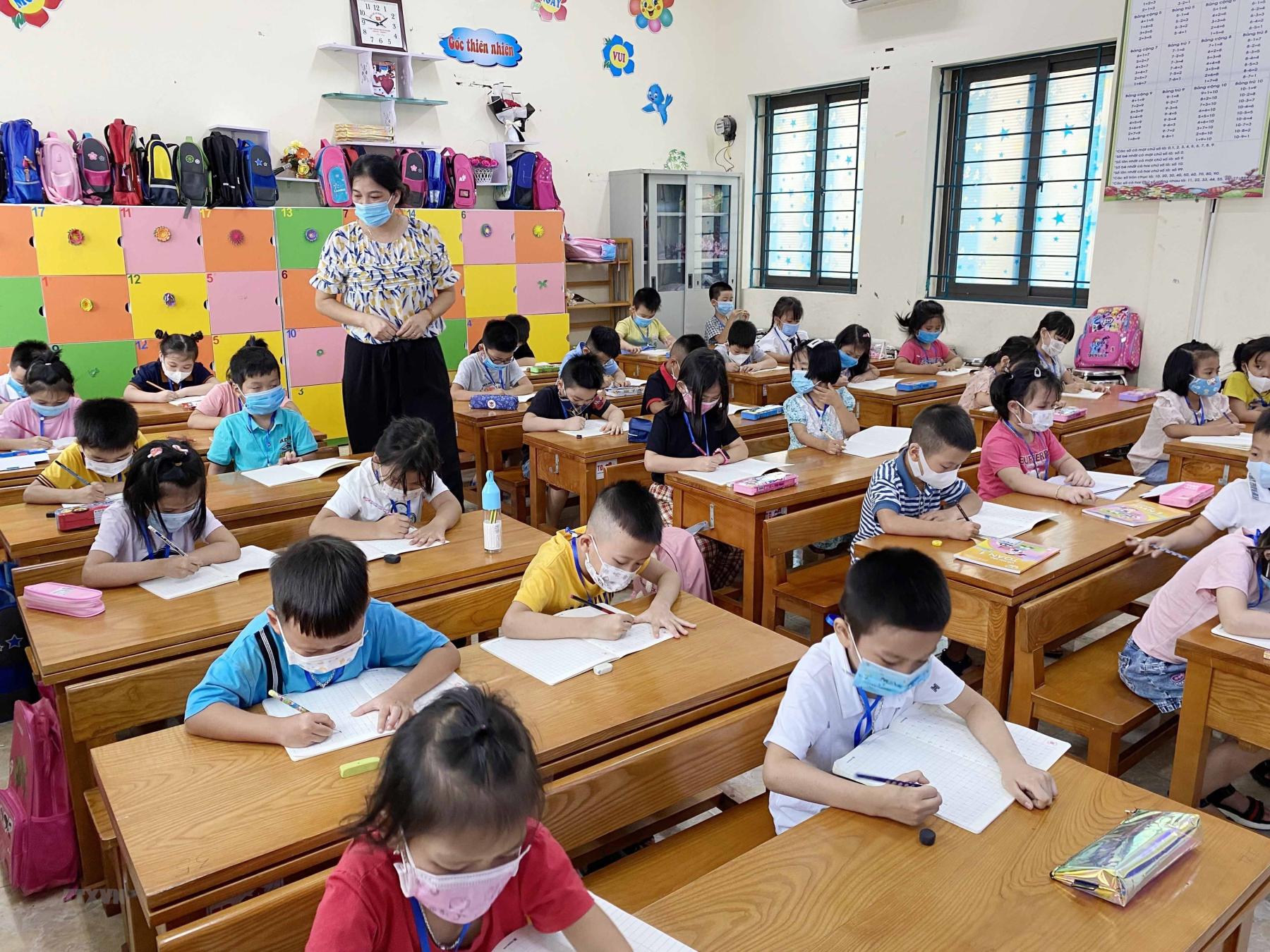Current regulations on types of primary schools and classes in Vietnam
What are the types of primary schools and classes in Vietnam? - Yen Nhi (Tien Giang)

Current regulations on types of primary schools and classes in Vietnam (Internet image)
Regarding this issue, LawNet would like to answer as follows:
1. Current regulations on types of primary schools and classes in Vietnam
Types of primary schools and classes in Vietnam according to Article 4 of the Charter issued with Circular 28/2020/TT-BGDDT are as follows:
- Primary schools are organized in two types: public and private.
+ Public primary schools invested in by the state, ensuring operating conditions and owner representation.
+ Private primary schools are invested in by domestic or foreign investors and ensure operating conditions.
- Primary school classes in high schools with many levels, and specialized schools include:
+ Primary school classes in high schools with many levels.
+ Primary school class in an ethnic boarding high school.
+ Primary school class in an educational facility for disabled children.
+ Primary class in a reformatory.
- Other educational establishments implementing general education programs at the primary level: community learning centers; classes for children in difficult circumstances who cannot go to school, and classes for children with disabilities.
2. Regulations on principals and vice principals of primary schools in Vietnam
Regulations on principals and vice principals of primary schools in Vietnam according to Article 11 of the Charter issued with Circular 28/2020/TT-BGDDT are as follows:
* Principal:
- The primary school principal is the person responsible for managing and administering the school's activities and educational quality.
- The person appointed as a principal for a public school or recognized as a principal for a private school must meet the standards specified in the Standard for principals of general education establishments and ensure the following requirements: must meet the standard training qualifications of teachers according to the provisions of the Education Law for primary schools; Has taught for at least 5 years (or 04 years for mountainous areas, islands, highlands, remote areas, ethnic minority areas, and areas with extremely difficult socio-economic conditions) at the primary level.
- The term of office of a primary school principal is 5 years. After each school year, the principal receives feedback from school officials and employees and is evaluated by competent authorities according to regulations. The principal shall work at a public primary school for no more than two consecutive terms.
- Duties and powers of the principal:
+ Developing strategies and plans for school development; planning and organizing the implementation of teaching and educational plans; Report and evaluate implementation results to the School Council and competent authorities.
+ Establishment of professional groups, office groups, and emulation and reward councils; Disciplinary council, advisory council in the school; appointing team leaders and deputy team leader; and appointing a teacher to be General in charge of the Ho Chi Minh Young Pioneers.
+ Carrying out management tasks for officials, teachers, and employees according to the provisions of the law and instructions of educational management agencies; developing plans to develop professional capacity for teachers and staff; Motivating and creating conditions for teachers and staff to participate in educational innovation activities; Evaluating and classifying teachers and staff according to the regulations of the Ministry of Education and Training; participating in the process of recruiting, transferring, and arranging teachers; Organizing steps to introduce personnel and request competent authorities to appoint vice principals.
+ Managing, receiving students, and allowing students to transfer schools; deciding to discipline and reward students; Approve student evaluation results and a list of students promoted to the next grade or repeating a grade; Organize testing to certify the completion of the primary school program for students in the school and other subjects in the school's area of responsibility.
+ Organizing and implementing the general education program at the primary school level according to regulations of the Ministry of Education and Training; textbooks and local educational content according to the decision of the Provincial People's Committee. Managing, using, and selecting reference publications for use in schools according to regulations of the Ministry of Education and Training.
+ Participating in activities with professional groups; self-study, and self-training to improve professional and management capacity. Attending training courses on politics, expertise, and management skills; Participate in teaching according to regulations on lesson norms for the principal.
+ Administrative management; managing and exercising autonomy in the use of financial resources and school assets according to regulations.
+ Organizing and implementing democratic regulations at the grassroots level; carrying out educational socialization; coordinating and organizing; mobilizing social forces to participate in educational activities; and promoting the role of the school in the social community.
+ Building a safe, healthy, and friendly school environment and preventing and combating school violence according to the provisions of the law.
+ Receiving allowances for teachers and preferential policies according to regulations.
* Vice-president:
- The Vice Principal is an assistant to the principal and is responsible to the principal for managing work assigned by the principal; and managing school activities when authorized by the principal.
- The person appointed as a vice principal for a public school or recognized as a vice principal for a private school must meet a high level of professional standards for teachers of general education establishments; Have enough capacity to undertake tasks assigned by the principal and ensure the following requirements:
+ Meeting the standard training qualifications of teachers according to the provisions of the Education Law for primary schools;
+ Having taught for at least 05 years (or 04 years for mountainous areas, islands, highlands, remote areas, ethnic minority areas, and areas with extremely difficult socio-economic conditions) in primary.
- The term of office of a deputy principal of an primary school is 5 years. After each school year, the vice principal receives feedback from the principal, officials, and employees of the school and is evaluated by competent authorities according to regulations.
- Duties and powers of the Vice Principal:
+ Taking responsibility for managing work assigned by the principal; managing school activities when authorized by the principal.
+ Participating in activities with professional groups; self-study and self-training to improve professional and management capacity; Attending training courses on politics, expertise, and management skills; Participate in teaching according to regulations on lesson norms for vice principals.
+ Enjoying allowances and preferential policies for teachers according to regulations.
- Key word:
- primary schools
- in Vietnam
- Cases of land rent exemption and reduction under the latest regulations in Vietnam
- Economic infrastructure and social infrastructure system in Thu Duc City, Ho Chi Minh City
- Regulations on ordination with foreign elements in religious organizations in Vietnam
- Increase land compensation prices in Vietnam from January 1, 2026
- Determination of land compensation levels for damage during land requisition process in Vietnam
- Who is permitted to purchase social housing according to latest regulations in Vietnam?
-

- Emergency response and search and rescue organizations ...
- 10:29, 11/09/2024
-

- Handling of the acceptance results of ministerial ...
- 09:30, 11/09/2024
-

- Guidance on unexploded ordnance investigation ...
- 18:30, 09/09/2024
-

- Sources of the National database on construction ...
- 16:37, 09/09/2024
-

- General regulations on the implementation of administrative ...
- 11:30, 09/09/2024
-

- Notable new policies of Vietnam effective as of ...
- 16:26, 11/04/2025
-
.Medium.png)
- Notable documents of Vietnam in the previous week ...
- 16:21, 11/04/2025
-
.Medium.png)
- Notable documents of Vietnam in the previous week ...
- 16:11, 02/04/2025
-
.Medium.png)
- Notable new policies of Vietnam to be effective ...
- 16:04, 02/04/2025
-
.Medium.png)
- Notable new policies of Vietnam effective from ...
- 14:51, 21/03/2025

 Article table of contents
Article table of contents
